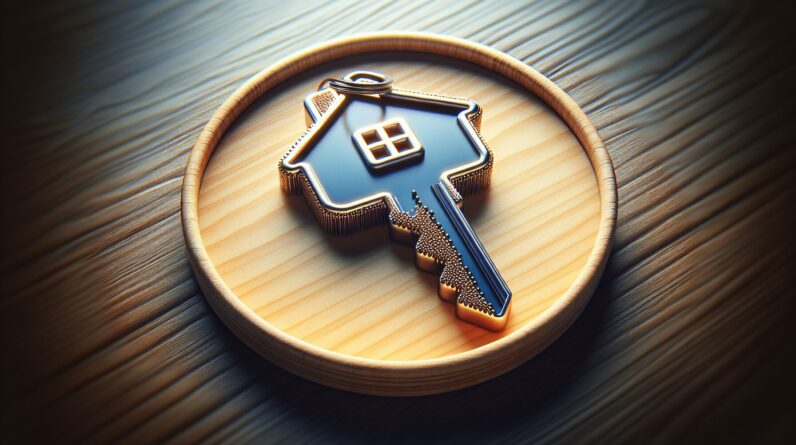So, you’ve been considering buying an investment property or a second home, but you’re not quite sure if it’s possible to use a mortgage loan for that. Well, the answer is yes! In fact, using a mortgage loan can be a great option if you’re looking to finance the purchase of an investment property or a second home. It’s a common practice that many people utilize to make these types of real estate investments more accessible. In this article, we’ll explore the ins and outs of using a mortgage loan for this purpose, helping you make an informed decision about your next property purchase.
Table of Contents
1. Mortgage Loan Basics
1.1 What is a mortgage loan?
A mortgage loan is a type of loan that is specifically used for purchasing a property. It is secured by the property itself, which means that if the borrower fails to make their loan payments, the lender has the right to take ownership of the property through a process known as foreclosure. Mortgage loans are typically large sums of money that are repaid over a long period of time, usually 15 to 30 years.
1.2 Types of mortgage loans
There are several types of mortgage loans available, each with its own specific features and benefits. Some common types of mortgage loans include:
-
Conventional Loans: These are traditional mortgage loans offered by banks or lenders. They often require a down payment of at least 20% and have fixed interest rates.
-
FHA Loans: These loans are insured by the Federal Housing Administration and are geared towards first-time homebuyers. They often require a lower down payment and have more flexible qualification criteria.
-
VA Loans: VA loans are specifically for veterans, active-duty military members, and surviving spouses. They offer favorable terms, such as no down payment and lower interest rates.
-
USDA Loans: These loans are offered by the United States Department of Agriculture and are designed to help low-to-moderate-income borrowers in rural areas. They often offer 100% financing and low-interest rates.
2. Financing Investment Properties
2.1 Can I use a mortgage loan to buy an investment property?
Yes, it is possible to use a mortgage loan to buy an investment property. However, the process may be slightly different compared to buying a primary residence. When buying an investment property, lenders typically have stricter requirements and may charge higher interest rates. It’s important to understand these differences and consider the implications before proceeding.
2.2 Considerations for financing investment properties
When financing an investment property, there are several factors to consider:
-
Loan Approval: Lenders typically require a higher credit score and a larger down payment for investment property loans. They may also have stricter debt-to-income ratio requirements.
-
Rental Income: Lenders may take potential rental income into account when determining loan eligibility. However, this rental income may need to be documented and proven through leases and other supporting documents.
-
Cash Flow: It’s important to evaluate the potential cash flow of the investment property. This includes considering expenses such as property taxes, insurance, maintenance, and vacancy rates. Lenders may also want to see a certain level of cash reserves to cover potential expenses.
-
Investment Strategy: Consider your long-term investment strategy and goals. Are you looking for regular rental income or capital appreciation? This can help determine the type of investment property you should pursue and the financing options available.

3. Financing Second Homes
3.1 Can I use a mortgage loan to buy a second home?
Yes, you can use a mortgage loan to buy a second home. This is often referred to as a vacation home or a secondary residence. However, similar to financing an investment property, there may be some differences compared to buying a primary residence.
3.2 Factors to consider when financing second homes
When financing a second home, there are a few factors to consider:
-
Loan Requirements: Lenders may require a higher credit score and a larger down payment for second home loans. The specific requirements may vary depending on the lender and the type of loan.
-
Usage Restrictions: Some lenders may have restrictions on the amount of time the property can be rented out or used as a vacation home. Make sure to check with the lender about any usage restrictions before making a purchase.
-
Affordability: Consider the overall affordability of owning a second home. In addition to the mortgage payment, you will need to account for other expenses such as taxes, insurance, maintenance, and potentially travel costs if the second home is located far from your primary residence.
-
Personal Use vs. Rental Income: Clarify whether the second home will primarily be for personal use or if you plan to generate rental income from it. This can impact your financing options and tax implications.
4. Qualifying for a Mortgage Loan
4.1 How to qualify for a mortgage loan for an investment property
Qualifying for a mortgage loan for an investment property may involve stricter requirements compared to buying a primary residence. Some factors lenders may consider include:
-
Credit Score: A strong credit score is important when applying for an investment property loan. Lenders typically prefer borrowers with a credit score of 620 or higher.
-
Debt-to-Income Ratio: Lenders may require a lower debt-to-income ratio for investment property loans. This is to ensure that borrowers have sufficient income to cover both their personal expenses and any potential rental income.
-
Down Payment: Expect to make a larger down payment for an investment property loan. Lenders often require a down payment of at least 20% to 25%.
-
Cash Reserves: Lenders may want to see that you have sufficient cash reserves to cover unexpected expenses or periods of vacancy.
4.2 How to qualify for a mortgage loan for a second home
Qualifying for a mortgage loan for a second home often follows similar guidelines as buying a primary residence. Some key factors lenders may consider include:
-
Credit Score: A good credit score is important when applying for a second home loan. Lenders typically prefer borrowers with a credit score of 620 or higher.
-
Debt-to-Income Ratio: Lenders will assess your debt-to-income ratio, which compares your monthly debt obligations to your income. A lower ratio indicates a stronger financial position.
-
Down Payment: The down payment requirement for a second home loan may vary depending on the lender and the type of loan. Generally, a larger down payment will help improve your chances of approval.
-
Property Usage: Lenders may take into account how you plan to use the second home. If it will primarily be for personal use, lenders may have different criteria compared to if you plan to generate rental income.

5. Loan-to-Value Ratio
5.1 What is loan-to-value ratio?
Loan-to-value (LTV) ratio is a measure used by lenders to assess the risk of a mortgage loan. It is calculated by dividing the loan amount by the appraised value or purchase price of the property, whichever is lower. The LTV ratio helps lenders determine the level of equity in the property and the borrower’s financial commitment.
5.2 Loan-to-value ratio for investment properties
Lenders often have stricter LTV ratio requirements for investment properties compared to primary residences. This is because investment properties are considered higher risk. The specific requirements may vary depending on the lender, but generally, an LTV ratio of 80% or lower is preferred for investment properties.
5.3 Loan-to-value ratio for second homes
The LTV ratio for second homes is typically similar to primary residences. Lenders may require an LTV ratio of 80% or lower, but it can vary depending on factors such as the borrower’s creditworthiness and the type of loan being applied for.
6. Interest Rates and Terms
6.1 Interest rates for investment properties
Interest rates for investment properties are often slightly higher compared to primary residences. This is because lenders perceive investment properties as higher risk due to the potential for vacancies or defaulting on rental payments. Interest rates for investment properties are influenced by factors such as the borrower’s credit score, loan term, and loan-to-value ratio.
6.2 Interest rates for second homes
Interest rates for second homes are typically similar to primary residences, although they may be slightly higher. The interest rate will depend on various factors such as the borrower’s creditworthiness, loan term, and loan-to-value ratio.
6.3 Loan terms for investment properties
Loan terms for investment properties can vary, but they are often slightly shorter compared to primary residences. Common loan terms for investment properties range from 15 to 30 years. Shorter loan terms may result in higher monthly payments but can help pay off the property faster.
6.4 Loan terms for second homes
Loan terms for second homes are typically similar to primary residences. They can range from 15 to 30 years, depending on the borrower’s preferences and financial goals. Longer loan terms result in lower monthly payments but may accrue more interest over time.

7. Down Payment Requirements
7.1 Down payment requirements for investment properties
Down payment requirements for investment properties are generally higher compared to primary residences. Lenders may require a down payment of 20% to 25% or more. A larger down payment can help reduce the lender’s risk and potentially result in more favorable loan terms.
7.2 Down payment requirements for second homes
Down payment requirements for second homes are typically similar to primary residences. Lenders may require a down payment of 10% to 20% or more, depending on factors such as the borrower’s creditworthiness and the type of loan being applied for.
8. Rental Income Considerations
8.1 Using rental income for loan qualification
Lenders may take potential rental income into account when qualifying borrowers for an investment property loan. Rental income can help improve the borrower’s debt-to-income ratio and overall loan eligibility. However, lenders often require documentation to verify the potential rental income, such as leases, rental history, and market analysis reports.
8.2 Expected rental income vs. actual rental income
It’s important to note that lenders may only consider a portion of the expected rental income when determining loan eligibility. They typically apply a percentage, known as the vacancy factor, to account for periods when the property may be vacant or not fully rented. Lenders may also consider the borrower’s experience as a landlord and the rental market in the property’s location.

9. Tax Implications
9.1 Tax benefits of owning an investment property
Owning an investment property can have various tax benefits. Some potential tax deductions for investment properties include:
-
Mortgage Interest: The interest paid on the mortgage loan for an investment property is generally tax-deductible.
-
Property Expenses: Expenses related to the investment property, such as property taxes, insurance, repairs, and maintenance, can often be deducted.
-
Depreciation: Investment property owners can take advantage of depreciation deductions, which allow them to recover the cost of the property over time.
It’s important to consult with a tax professional to fully understand the tax implications specific to your situation.
9.2 Tax considerations for second homes
Tax considerations for second homes may differ from primary residences and investment properties. For example:
-
Personal Use: If the second home is used primarily for personal use and not rented out, tax deductions may be limited to mortgage interest and property taxes.
-
Rental Income: If the second home is rented out for a portion of the year, tax deductions may include mortgage interest, property taxes, and a percentage of other expenses related to the rental activity.
Again, consulting with a tax professional is recommended to understand the specific tax implications for your second home.
10. Risks and Considerations
10.1 Risks of investing in real estate
Investing in real estate, whether for an investment property or a second home, comes with certain risks. Some potential risks to consider include:
-
Market Volatility: Real estate markets can experience fluctuations in property values, which can impact the potential for appreciation and profitability.
-
Financing Risks: There is always a risk that interest rates may rise, increasing the cost of borrowing. This can impact the cash flow and profitability of the investment property or second home.
-
Vacancy and Income Loss: Investment properties and second homes may experience periods of vacancy or lower-than-expected rental income, impacting the potential return on investment.
10.2 Potential issues with second homes
Owning a second home also comes with its own set of considerations and potential issues. Some factors to keep in mind include:
-
Maintenance and Management: Second homes may require regular maintenance and management, even during periods of non-use. This can add additional expenses and responsibilities.
-
Affordability: Owning a second home can be costly, especially when factoring in mortgage payments, insurance, property taxes, and ongoing maintenance.
-
Personal Use vs. Rental Income: Balancing personal use and rental income can be challenging. If the second home is primarily for personal use, it may limit the potential for rental income and impact the overall financial viability.
In conclusion, using a mortgage loan to buy an investment property or second home is possible, but it’s important to carefully consider the specific requirements, risks, and considerations associated with each scenario. Working with a knowledgeable lender and potentially consulting with a real estate professional can help guide you through the process and ensure you make informed decisions.








